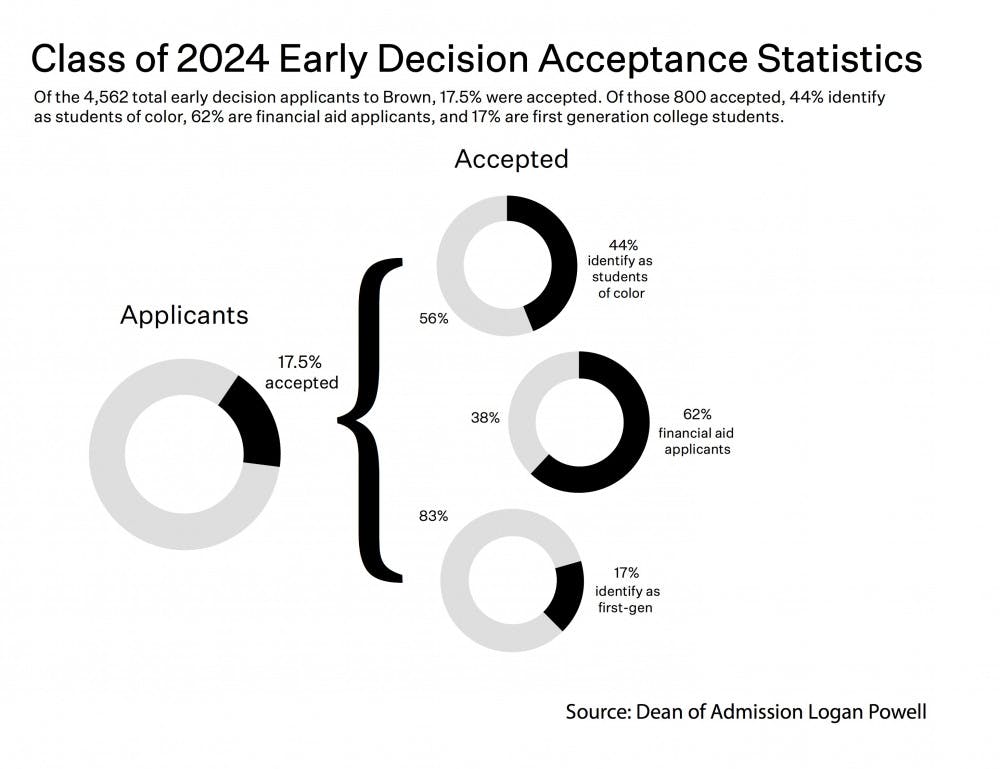The University accepted a record low 17.5 percent of early applicants to the class of 2024, according to Dean of Admission Logan Powell.
A total of 4,562 students applied to the University through early decision, an 8 percent increase from last year which Powell called a “remarkable rate of growth.”
Of the 800 newly admitted students, 17 percent identify as first-gen, up from 11 percent for the early decision admits to the class of 2023. Consistent with last year's demographics, 44 percent of students self-identify as students of color. Students applying for financial aid account for 62 percent of admitted students, up from 57 percent last year and 50 percent two years ago.
The increase in applicants “really has been a strong testament to the power of the Brown Promise in socioeconomically diversifying the applicant pool for early decision,” Powell said.
The Brown Promise eliminated loans from financial aid packages starting with the Class of 2022. Since then, “students who see now that they can graduate debt-free are much more likely to apply to Brown early decision than in previous years,” Powell said.
Powell said that in his mind, the increase in first-gen representation is a particular highlight of this early decision pool. First-gen students “are remarkably smart and interesting and come from all over the country,” Powell said.
Students applying for financial aid are frequently advised by counselors to apply regular decision in order to compare financial aid packages across multiple institutions, Powell said. But the 12 percent increase in students applying for need-based aid over the past two years shows that these students now “have the confidence that our financial aid will provide them all the support they need for their four-year Brown experience,” he said.
Forty states are represented in the pool of accepted students, as well as the District of Columbia and Puerto Rico. Within the international cohort of new members of the Class of 2024, students hail from 43 nations, led by China, the United Kingdom, South Korea, Canada and India.
Twenty students were admitted to the Program in Liberal Medical Education. Brown RISD dual degree students are selected during the regular decision process.
Forty-five students were accepted to the University through the QuestBridge match program. QuestBridge’s selective National Match Program offers low-income high school students an opportunity to receive a full scholarship to one of 40 colleges and universities that partner with the organization, The Herald previously reported.
The growth in acceptances through QuestBridge “was absolutely a deliberate choice on our side,” Powell said, noting that the Admission Office has been able to strengthen the University’s partnership with the program with the support of Provost Richard Locke P '18. QuestBridge “is an amazing source to help us identify some of the most talented low-income students in the country,” Powell said.
The group of 800 students is the first to be admitted to the University following the “Varsity Blues” admissions scandal last spring, which garnered nationwide attention and called for more equitable admissions practices.
In light of the scandal, President Christina Paxson P’19 convened an Ad Hoc Committee on Integrity and Equity in Admissions in order to examine practices at the University, headed by Locke and Corporation Fellow Maria Zuber.
Paxson released the findings of this committee in a Today@Brown announcement this morning. The committee found no evidence of wrongdoing in University admissions practices, she wrote, particularly in regards to coaching and athletic recruitment practices, two concerns which were raised in response to evidence of falsified recruiting profiles investigated in the nationwide scandal.
“In the case of athletes, the admissions and athletics departments work together closely, starting from even before students submit applications, to ensure that applicants have the capability to thrive at Brown academically,” Paxson wrote in the announcement. “Once students matriculate, Brown’s practice of having weekly meetings to review participation rates and retention of athletes would make it almost impossible for a coach to recruit students who do not have athletic credentials.”
The University will continue to closely monitor admissions practices in order to ensure that they meet high standards of ethics and integrity, Paxson wrote, and will “implement measures that will mitigate potential vulnerabilities in the admissions process.”
These measures include audits of randomly -selected students who have matriculated but not yet enrolled at the University. The audits will be conducted in May “allowing students found to have compromised applications to determine their alternative educational path after Brown withdraws their admission,” she wrote. “We will also require independent documentation (from newspaper articles, awards etc.) that student-athlete applicants have in fact participated in their sport while in high school.”
Additionally, the University will “expand its existing conflict-of-interest disclosure for coaches, admissions officers and faculty involved in reviewing applicant files,” as well as “formalize compliance around Brown’s standing policy against engaging in gift conversations with families whose children are in the applicant pool.”

ADVERTISEMENT




